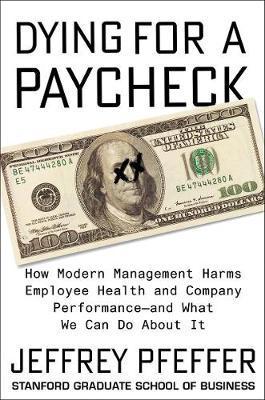Dying for a Paycheck

Dying for a Paycheck
In one survey, 61 percent of employees said that workplace stress had made them sick and 7 percent said they had actually been hospitalized. Job stress costs US employers more than $300 billion annually and may cause 120,000 excess deaths each year. In China, 1 million people a year may be dying from overwork. People are literally dying for a paycheck. And it needs to stop.In this timely, provocative book, Jeffrey Pfeffer contends that many modern management commonalities such as long work hours, work-family conflict, and economic insecurity are toxic to employees--hurting engagement, increasing turnover, and destroying people's physical and emotional health--and also inimical to company performance. He argues that human sustainability should be as important as environmental stewardship.You don't have to do a physically dangerous job to confront a health-destroying, possibly life-threatening, workplace. Just ask the manager in a senior finance role whose immense workload, once handled by several employees, required frequent all-nighters--leading to alcohol and drug addiction. Or the dedicated news media producer whose commitment to getting the story resulted in a sixty-pound weight gain thanks to having no down time to eat properly or exercise. Or the marketing professional prescribed antidepressants a week after joining her employer.In Dying for a Paycheck, Jeffrey Pfeffer marshals a vast trove of evidence and numerous examples from all over the world to expose the infuriating truth about modern work life: even as organizations allow management practices that literally sicken and kill their employees, those policies do not enhance productivity or the bottom line, thereby creating a lose-lose situation.Exploring a range of important topics including layoffs, health insurance, work-family conflict, work hours, job autonomy, and why people remain in toxic environments, Pfeffer offers guidance and practical solutions all of us--employees, employers, and the government--can use to enhance workplace wellbeing. We must wake up to the dangers and enormous costs of today's workplace, Pfef
PRP: 233.92 Lei
Acesta este Prețul Recomandat de Producător. Prețul de vânzare al produsului este afișat mai jos.
210.53Lei
210.53Lei
233.92 LeiLivrare in 2-4 saptamani
Descrierea produsului
In one survey, 61 percent of employees said that workplace stress had made them sick and 7 percent said they had actually been hospitalized. Job stress costs US employers more than $300 billion annually and may cause 120,000 excess deaths each year. In China, 1 million people a year may be dying from overwork. People are literally dying for a paycheck. And it needs to stop.In this timely, provocative book, Jeffrey Pfeffer contends that many modern management commonalities such as long work hours, work-family conflict, and economic insecurity are toxic to employees--hurting engagement, increasing turnover, and destroying people's physical and emotional health--and also inimical to company performance. He argues that human sustainability should be as important as environmental stewardship.You don't have to do a physically dangerous job to confront a health-destroying, possibly life-threatening, workplace. Just ask the manager in a senior finance role whose immense workload, once handled by several employees, required frequent all-nighters--leading to alcohol and drug addiction. Or the dedicated news media producer whose commitment to getting the story resulted in a sixty-pound weight gain thanks to having no down time to eat properly or exercise. Or the marketing professional prescribed antidepressants a week after joining her employer.In Dying for a Paycheck, Jeffrey Pfeffer marshals a vast trove of evidence and numerous examples from all over the world to expose the infuriating truth about modern work life: even as organizations allow management practices that literally sicken and kill their employees, those policies do not enhance productivity or the bottom line, thereby creating a lose-lose situation.Exploring a range of important topics including layoffs, health insurance, work-family conflict, work hours, job autonomy, and why people remain in toxic environments, Pfeffer offers guidance and practical solutions all of us--employees, employers, and the government--can use to enhance workplace wellbeing. We must wake up to the dangers and enormous costs of today's workplace, Pfef
Detaliile produsului










